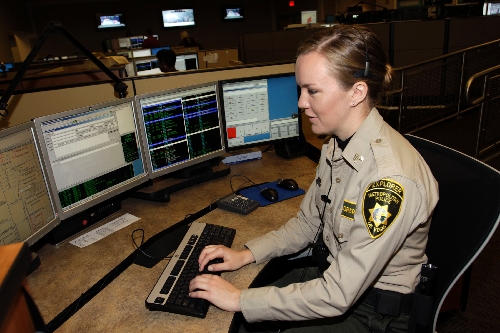Youths investigate what it’s like working in law enforcement
A new group of young people interested in police work are set to begin applying for the Metropolitan Police Department's explorer program in early February, and officer Mike Rodriguez said the experience can teach young people about more than police work .
"The program is designed to educate youth by developing an interest in law enforcement while instilling life skills such as leadership, academic excellence, respect and physical fitness," Rodriguez said about the program that targets youths ages 16 to 20.
Rodriguez, a former explorer in Ann Arbor, Mich., said the Metropolitan Police Department has had its own program since the late 1970s. He said many of the volunteer advisers to the program were once explorers , too. "This is a way for them to pay it forward," he said.
In weekly sessions, the explorers are shown the ins and outs of a career in law enforcement, including training and supervision by commissioned officers and civilians.
"The program also works to develop relationships between the police department and our community's youth," Rodriguez said.
The program has 100 explorers spread across the department's eight area commands, he said, assigned based on where they live and their interest.
Additionally, the program offers posts at the jail, dispatch and crime scene investigation department. Those three assignments tend to see the highest turnover, he said, because people jump to assumptions based on what they see on television but do not consider the required skills.
Crime scene investigations, for example, require an extensive science background, he said. But if explorers do not like their assignment, they can switch to another command. Some explorers apply to the program with a focus on the technical police work and prepare with Advanced Placement courses in biology and chemistry, he said. "They go right into it, and they love it," he said.
The unpaid explorers can stay through their 21st birthday, when many apply to police academies. While Rodriguez said the explorer background can be helpful when applying for officer positions, he added that applicants who complete the program are still required to apply and go through the academy.
"It definitely helps when they apply because they know what to expect in the academy and because they are already going to know so much of what the academy is going to teach them," Rodriguez said.
Many pursue law enforcement, he said, but the program is also useful in helping people figure out that they are not interested in becoming a police officer before investing time at the academy or on the force.
Explorer Aaron Kalas, 19, captain of the program at the South Central Area Command, 4860 Las Vegas Blvd. South, joined the program four years ago after his father suggested it. Kalas said he knew he wanted to be a police officer at 14 years old, even though no one else in his family works in law enforcement. His father wanted him to join the explorer program to "give it a try."
Even as an explorer, Kalas said he feels fulfilled and plans to pursue a law enforcement career when he turns 21. He plans to take the admissions test in Las Vegas, where he would like to work, but will also apply in Henderson, North Las Vegas and out of state because of hiring freezes.
"I want to work and make a difference. I don't want to go to a day job," Kalas said. "You're helping people, keeping people safe. It's a rewarding job."
As captain, Kalas helps organize explorer meetings, takes care of the equipment and acts as a liaison between the class and the officers regarding the curriculum.
The program helped him mature, he said. "You can't play around in little high school games anymore," he said.
Kalas also works in an auto repair shop at a resort on the Strip and is in the reserves for the U.S. National Guard.
"It definitely helps you in more ways than most people realize," Kalas said. "Every job I've applied to sees that I'm a police explorer, and it definitely impresses them."
The most challenging aspect, Kalas said, was explorer academy. He said there were a couple of days that he was not sure he would be able to complete the tasks.
"At the end of the day, the officers bring out the best of you," he said. "You find that intestinal fortitude and you get through. Even if you're not sure you want to be a police officer, this program will help you make that decision."
And that benefits the city, too.
"It's definitely better than if they get on the street and decide that this was not what they expected and then they quit," Rodriguez said. "We try to expose them to every element of the career so they can make a sound decision that this is what they want to do."
Explorers generally spend between seven and 10 hours a week in the program. Kalas said that while it is a time commitment, dedicated explorers have no problem balancing their responsibilities at the command and at school.
The program has no operating budget. The explorers are provided with a basic uniform, but that funding comes from community donations, Rodriguez said.
To apply , visit lvmpd.com/communityprograms/explorers.aspx. For more information, email explorers@lvmpd.com.
Contact Centennial and North Las Vegas View reporter Laura Phelps at lphelps@viewnews.com or 702-477-3839.
TRY THE EXPLORER PROGRAM
The Metropolitan Police Department's explorer program is open to youths ages 16 to 20. Those younger than 18 must have a parent or guardian attend a meeting to sign liability and medical forms. Explorers generally spend between seven and 10 hours a week in the program. The next application process is set to begin in early February. To apply, visit the department's community programs page.


















